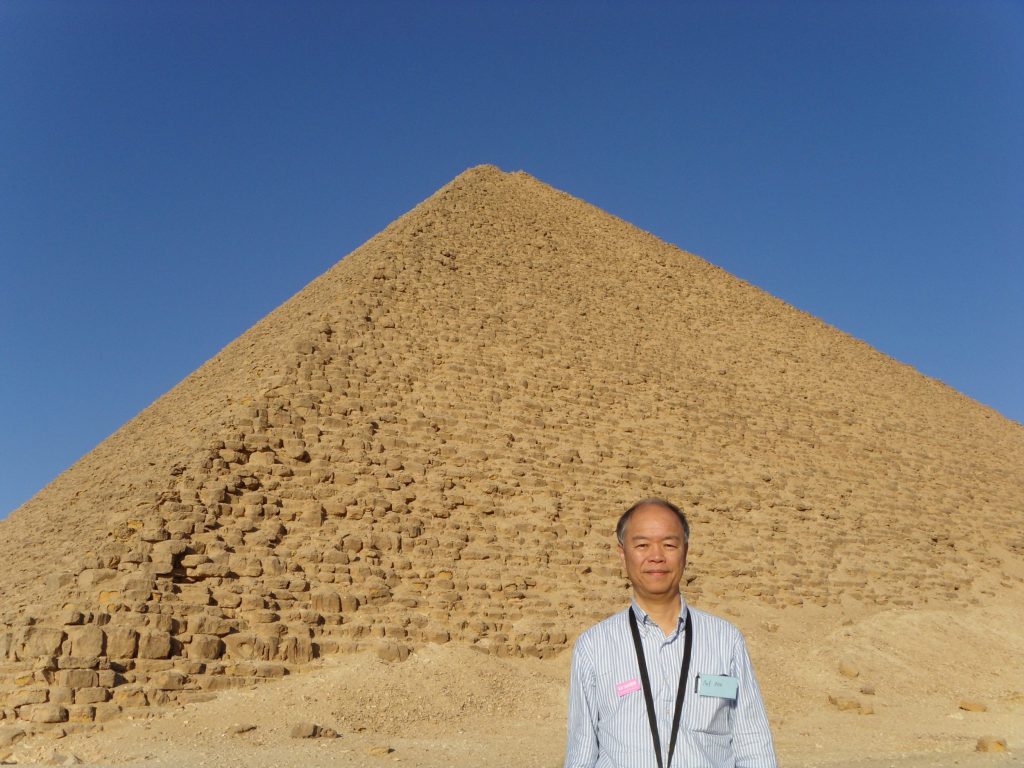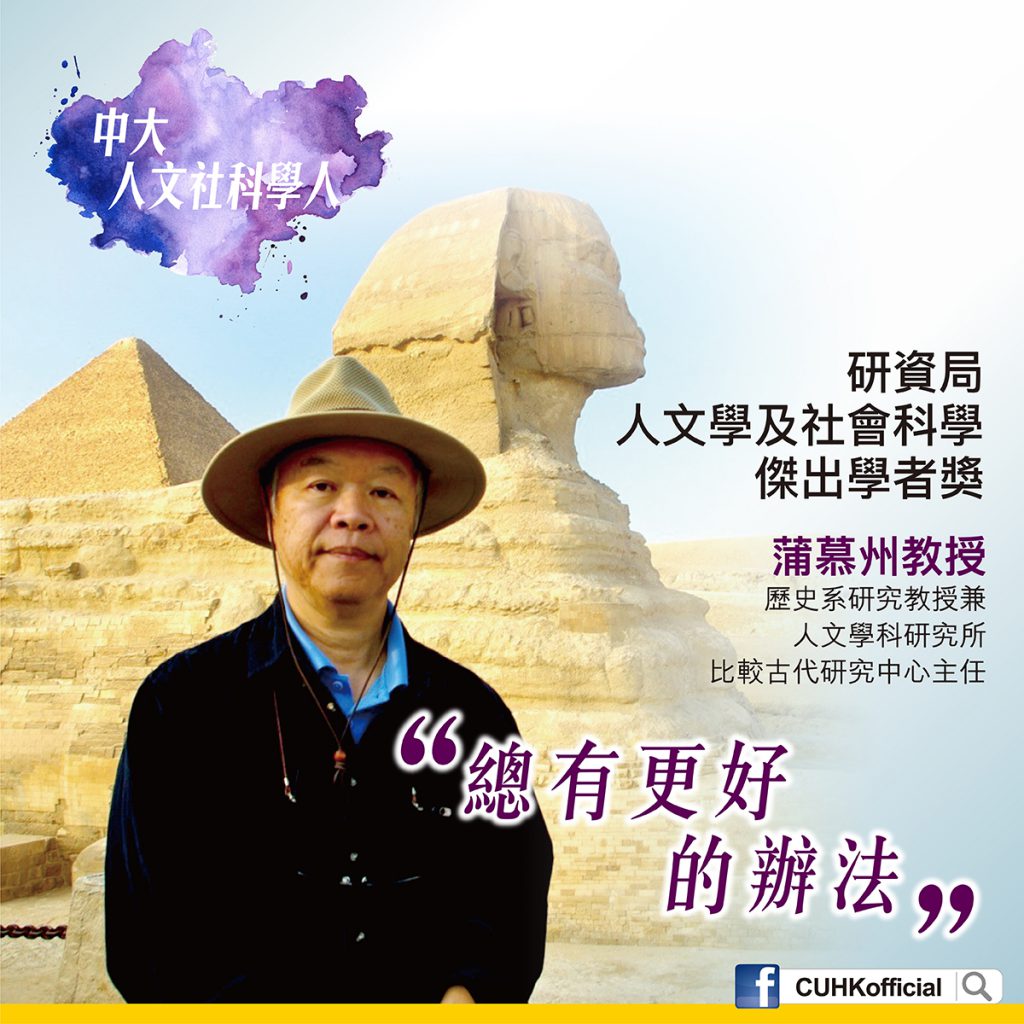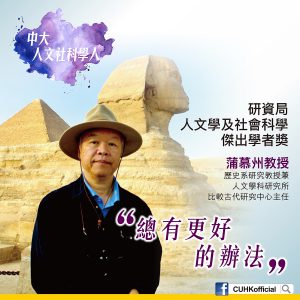Achievements
Professor Poo Mu Chou Explores the Foundation of Happiness from Death
Throughout history, people have been eager to unravel the mystery of life and death, with an especially strong curiosity and imagination about the world of the afterlife. Professor Poo Mu Chou, Research Professor of the Department of History and Director of the Centre for the Comparative Study of Antiquity of the Research Institute for the Humanities at The Chinese University of Hong Kong (CUHK) is one of them. He considers that imagination about the netherworld reflects expectations for the life of the living, in the inner mind. Therefore, he combines an understanding of two kingdoms, China and Ancient Egypt, in a research project named “The Imagined Paradise: The Netherworld in Ancient Egypt and China”, the winning project of the 2019 RGC Humanities and Social Sciences Prestigious Fellowship.
Born in Taiwan, Professor Poo received his doctoral degree at John Hopkins University in the United States. Since then, he has committed himself to academic research of the religion and history of Ancient Egypt and China. He came to teach in CUHK in 2009 and before that he had been working in Academia Sinica in Taipei for 25 years. The reason that pushed Professor Poo to leave the job that he had for so long was that he wished to change his working environment and be in touch with students and educational work. The other reason was for “her”. “CUHK had approached my wife Professor Ping-chen Hsiung, to take over as the Dean of the Faculty of Arts, so the then Vice-Chancellor Lawrence Lau Juen-yee invited me to come to CUHK as well. After much deliberation, I had made up my mind to come with my wife.”

Professor Poo has committed himself to academic research of the religion and history of Ancient Egypt.
Pursuing the Path of Ancient Egyptian Civilization
Ancient Egypt is one of the four ancient civilizations of the World. It is also the origin of western culture. Professor Poo says, “Before I went to study in the United States, I didn’t actually know too much about Ancient Egypt. I initially intended to study the history and literature of the Greco-Romans, which is generally known as ‘the Classics.’ ” Taiwan was infatuated with western history but lacked teachers and courses in this area. On the other hand, research on Chinese history and culture has become mainstream in mainland China and Taiwan. He believes that people should know more about Western literature and history. “This drove me to further study and research in this direction.”
Language foundation was required before further study. However, Taiwan did not have courses for learning ancient Greek and Latin back in the 1970s, which hindered Professor Poo’s academic career. However, he learnt that Egyptology is a more specialised course in the United States and Europe. It could be taken at the postgraduate level. Therefore he changed to study Egyptology and stepped into the mysterious kingdom of the Pharaohs.

Professor Poo changed to study Egyptology and stepped into the mysterious kingdom of the Pharaohs.
Speaking of the unforgettable experience of doing research for many years, Professor Poo smiles bitterly, “The first step to getting in touch with Egyptology is definitely to learn the language. However, the threshold for studying this language is high. For people not familiar with Ancient Egypt, they had to study ancient scripts and modern languages including English, German, Italian, French and so on. These languages are important tools in research, but they are so hard to learn!”
Knowledge results from comparison
Delving into both Ancient Egyptian and Chinese history at the same time should be challenging. However, in the eyes of Professor Poo, the basic concept of historical research is “not setting any boundary for yourself by just focusing on one matter at a time. Making comparison may lead to a deeper understanding.” When comparing two matters, research tools including languages and references are all required. He laughs and says, “But my Chinese is definitely better than Egyptian.” He believes that studying Ancient Egypt could also help with the understanding of Chinese culture. “Without comparison, the understanding is never comprehensive. Knowledge results from comparison.” Professor Poo also emphasises that conducting research should not be prevented by the influence of preconceived notions. For example, research on the religion and culture of Ancient Egypt has been influenced by the study of Christianity and Judaism developed by the Europeans 200 years ago. If we do not fully understand the cultural background of modern scholarship that shapes the research results, we are not able to get the gist.
The Netherworld and This-World
Will people really go to the netherworld after death? This may be a question that can never be answered. However, Professor Poo considers that different cultures have created different kinds of solutions for the people to rely on. One of these would be religion, which accounts for a substantial part of Ancient Egyptian studies. Based on the imagination of the afterlife, ancient Egyptians had the concept of “netherworld” or “judgement after death”, which left us with plenty of historical and cultural materials. He points out, “Our understanding of Ancient Egypt usually comes from archeological discoveries of temples and tombs. They are strongly connected with religion.”
Ancient Chinese also had a broad imagination of the afterlife. How to compare these two cultures? How to get a meaningful result? Professor Poo chose the period of the pre-Qin to Han Dynasty, which was an era when Buddhism has not yet been introduced to China.. When he was conducting research on the topic, “The imagined paradise: The netherworld in ancient Egypt and China”, he compared the religious thinking of these two cultures and said, “Imagination of the netherworld is actually a cultural construction. These two cultures possessed a rich imagination of the netherworld, which reflects the ideal state for the living. For those things that could not be satisfied when people were alive, they hoped for a compensation after death.”
The netherworld could also reflect the social norm at that time. Professor Poo gives an example of ancient Egyptians vowing not to make mistakes or do evil deeds when they were alive. When facing God’s judgement after death, people could be admitted to the Elysium and live a carefree life. In the Han Dynasty, the ideas of the Chinese were different. There was no concept of “Elysium” but an “underground world”. Both living and afterlife worlds were bureaucratic societies. Citizens still had to work there and there seemed to be no big difference. However, the living could make use of magical rituals or other assistance. For instance, living people could bury surrogate money and other items to provide the deceased with a more comfortable life in the “underground world”.
Professor Poo believes that the netherworld is a projection of people’s so-called happy life. With such logic, it is possible to compare the core values of a happy life of these two cultures and understand their similarities and differences.
Insisting on “dealing with it!”
From the perspective of Professor Poo, cultural and historical research is surely a career that young people can devote themselves to. But he reminds everyone to think about one question, “Why do that?” He explains, “If you want to envision it as a lifelong career, you need to find the reason behind it. The question must be one that you are curious about and is meaningful to you. If this question is suggested by your instructor, you will not have any motivation. Only when it is coming out of your own driving desire will you have the impetus for further study and an insistence on ‘dealing with it’!”
“There might be a better way” is a motto that is also an aspiration to Professor Poo who has been on the road of teaching and research for many years. “I often felt unsatisfied with my research. However, people should never settle for the status quo. Research in humanities is actually a process of understanding problems. Even if there are results, they are not perfect. There is always room for improvement.”

Professor Poo suggests that people who would like to devote themselves to academic research need to have motivation.


